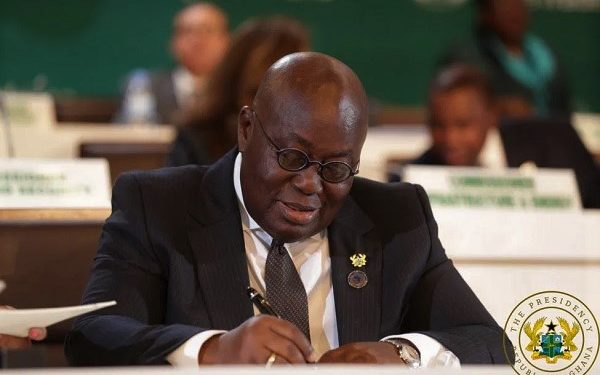Just before the commencement of the Cabinet meeting at Jubilee House in Accra, President Nana Addo Dankwa Akufo-Addo signed the Electronic Transfer Levy Bill (E-Levy) into law.
The bill has now become law as a result of his signing, but the Minister of Finance, Ken Ofori-Atta, will declare the operating date and other activities.
The bill was approved by Parliament on Tuesday after the Minority walked out in open defiance of the bill.
The bill included a 1.75 percent tax on all electronic transactions and money transfers at first, but the amount was dropped to 1.5 percent before it was passed.
Background
The bill had to be withdrawn when the National Democratic Congress (NDC) Minority in Parliament claimed that the First Deputy Speaker, Joseph Osei-Owusu, who was presiding as Speaker, made an error when he abandoned his chair to cast a vote to pass the measure.
This resulted in a melee and a few confrontations on the floor of Parliament, involving fisticuffs before the House was abruptly adjourned for the Christmas holidays.
Following that, the Minister of Finance held a series of public meetings, primarily in provincial capitals, to gain support for the levy, which was viewed as a new important income source for the government.
During the discussions, a Ghanaian individual petitioned the Supreme Court for an interpretation of whether a Deputy Speaker presiding over House proceedings may vote, and the Apex Court decided in his favor.
During the pause, there were proposals that the government could choose an IMF program to gain policy credibility and generate budgetary space so that it could borrow to fund its development programs.
The government, on the other hand, argued that it was capable of handling the issues on its own, a stance based on the Ghana Beyond Aid agenda.
President
In his statement to Parliament on the state of the nation last Wednesday, President Akufo-Addo expressed thanks to the House for finally passing the E-Levy Bill, despite the lengthy and often fractious nature of the procedures.
“I believe strongly the levy is going to make a significant contribution to revenue mobilisation and the management of the national economy, and I want to thank members of the House for making this possible,” he said.
Parliament
The approval occurred after 137 Minority MPs staged a walkout of the Chamber, claiming that they did not want to be linked with any further proceedings on the bill’s approval, which was being reviewed under a certificate of urgency.
The walkout occurred after the House had finished debating the measure and the Speaker had asked a question on the resolution to accept the report of the Finance Committee.
Mr. Ofori-Atta, who moved the motion, said the government had committed to taking the required steps to boost domestic revenue mobilization and strengthen the Ghana Revenue Authority’s (GRA) competency in evaluating electronic tax transactions without jeopardizing the government’s pro-poor interventions.
He also stated that mobile money transactions in Ghana grew from GH1.55 billion to GH9.86 billion between 2017 and 2021.
The E-Levy, according to the minister, was created to tap into e-transactions in order to broaden the tax net, boost the tax per capita ratio, and produce much-needed revenue for the government.
“The government is of the conviction that if all the people of Ghana share the burden of domestic revenue mobilization by equitably contributing their fair share of the taxes, the GH¢100 billion CARES Obaatan Pa program will successfully transform our economy to realize. the President’s vision of a Ghana Beyond Aid, a wiser, wealthier, inclusive and sustainable, empowered and resilient society,” Mr Ofori-Atta stated.
Read Also: Ukraine asks Kenyans for donations to support war
SOURCE: GRAPHIC ONLINE


























